Coronavirus government response updates: Trump criticizes Georgia's GOP governor, says 'too soon' to reopen
"But he has to do what he thinks is right," he said he told Gov. Brian Kemp.
Even as he pushed for governors to reopen their states, President Donald Trump on Wednesday criticized the Republican governor of Georgia for his decision to allow several different businesses to reopen Friday amid the novel coronavirus outbreak.
"I told the governor of Georgia, Brian Kemp, that I disagree strongly with his decision to open certain facilities which are in violation of the phase one guidelines for the incredible people of Georgia -- they're incredible people," he said at Wednesday's White House briefing.
Kemp has said he would allow nail salons, massage parlors, bowling alleys and gyms to open on Friday. The president, who apparently called Kemp after his news conference last night, said, "It's just too soon. I think it's too soon. Safety has to predominate."
"I told the governor very simply that I disagree with his decision, but he has to do what he thinks is right," Trump added.
Meanwhile, House lawmakers returned to Washington amid the highly contagious pandemic to vote Thursday on the Senate-passed $484 billion interim relief package that replenishes a small business loan program and also boosts funding to hospitals and testing, as Democrats demanded.
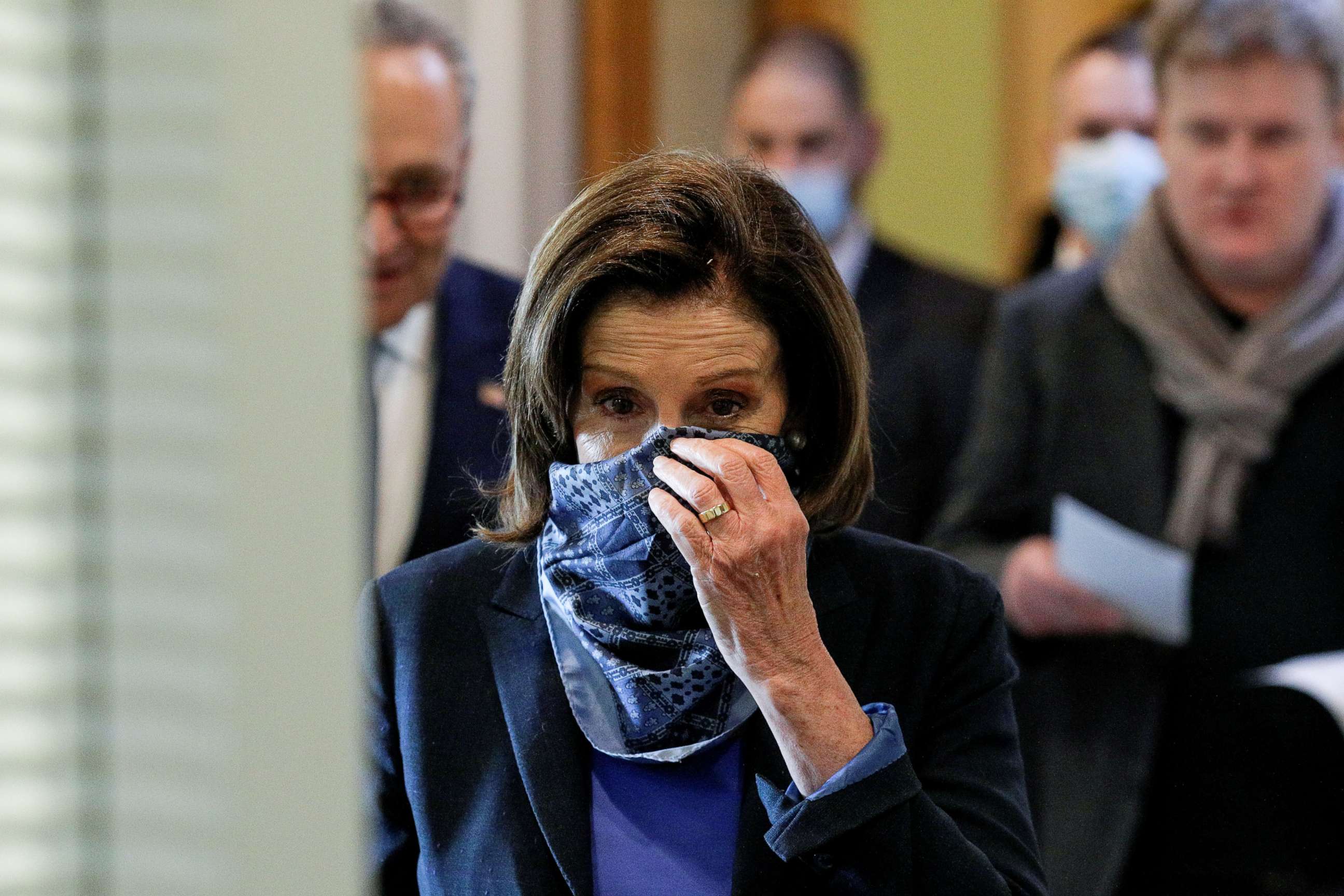
House Speaker Nancy Pelosi said she would press Trump for the "truth" on the availability of testing, which experts say is critical to any reopening.
"If the president refuses to accept evidence, data, truth and the rest, we must insist on the truth because that is the path," she told MSNBC's "Morning Joe."
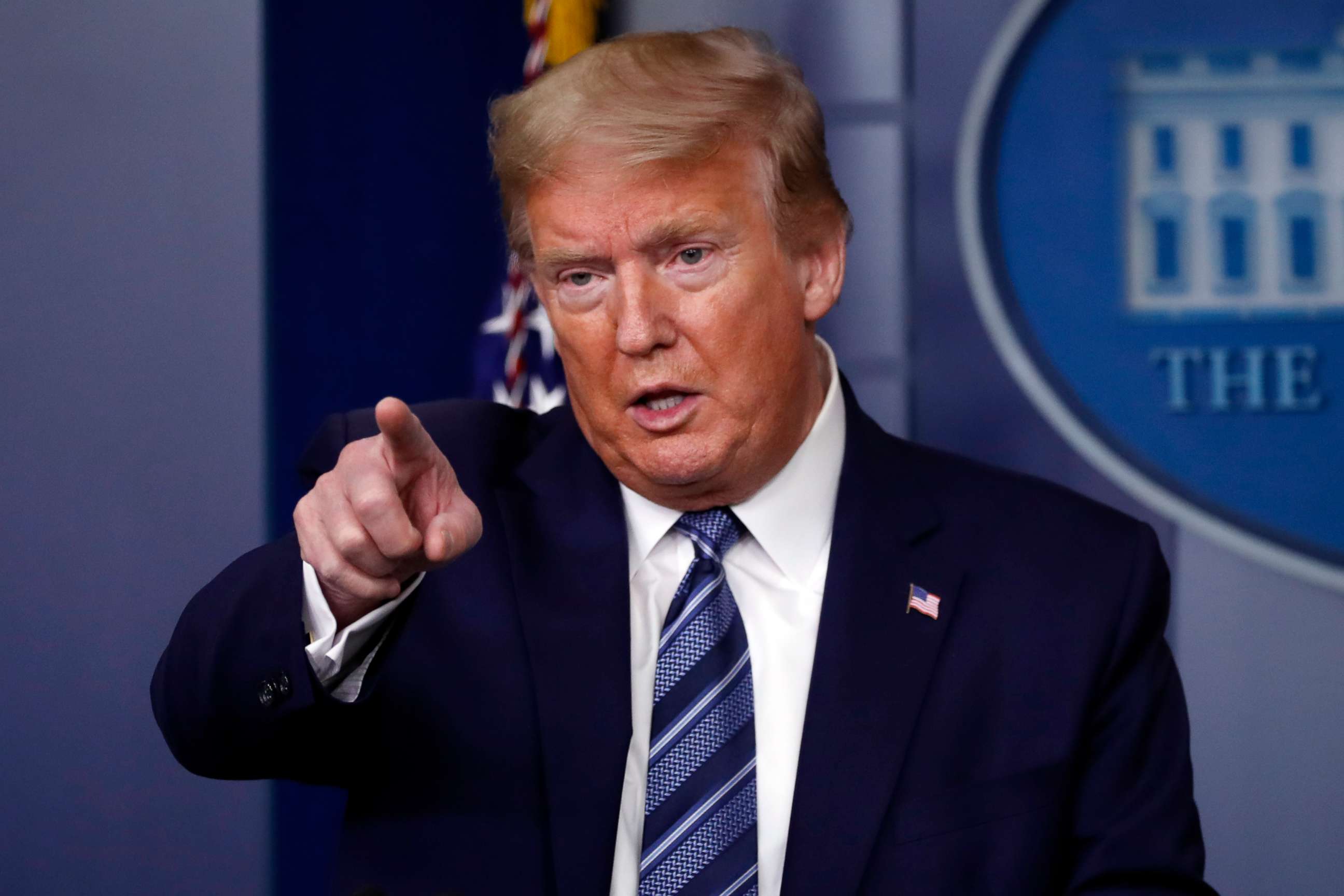
The president also downplayed the danger of the virus returning in the fall at the briefing, saying, "We may not even have corona coming back." And if it did, he said, it would just be in "pockets" and "embers."
Dr. Anthony Fauci, the nation's top infectious disease expert, contradicted the president, saying he was "convinced we will have coronavirus in the fall," but he and Dr. Deborah Birx, the coronavirus task force coordinator, both agreed that the impact would likely be less because the country would be better prepared.
Trump also said Wednesday he had signed an "executive order" -- the official White House document called it a "proclamation" -- to "pause" immigration for 60 days for those seeking green cards, claiming it would protect American jobs lost to the pandemic.
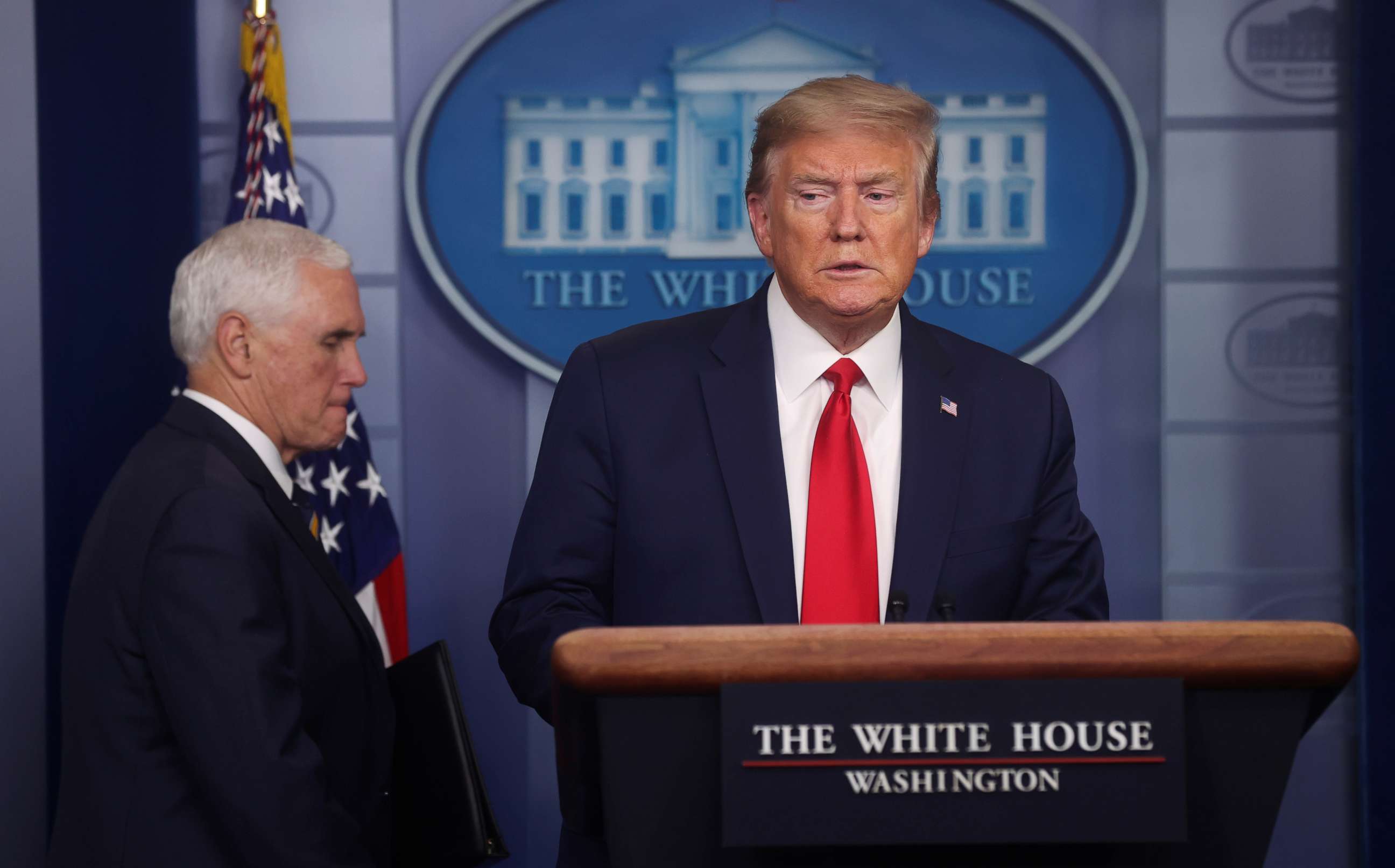
Tune into ABC at 1 p.m. ET and ABC News Live at 4 p.m. ET every weekday for special coverage of the novel coronavirus with the full ABC News team, including the latest news, context and analysis.
Here are Wednesday's most significant developments in Washington:
- At White House briefing, Trump, CDC's Redfield push back on headline that second wave of virus would be worse, Trump downplays risk
- Trump touts ‘Opening Up America Again' guidelines as states plan to reopen, but breaks from Georgia's Gov. Kemp
- Trump said he has signed an 'executive order' suspending legal immigration to the U.S., White House calls it 'proclamation'
- Trump says 'never heard of him' when asked about doctor claiming he faced retaliation for questioning use of drug Trump touted
- House vote expected Thursday after Senate passes deal on replenishing small business loan fund that also includes national testing plan pushed by Democrats
Here are the latest developments in the government response:
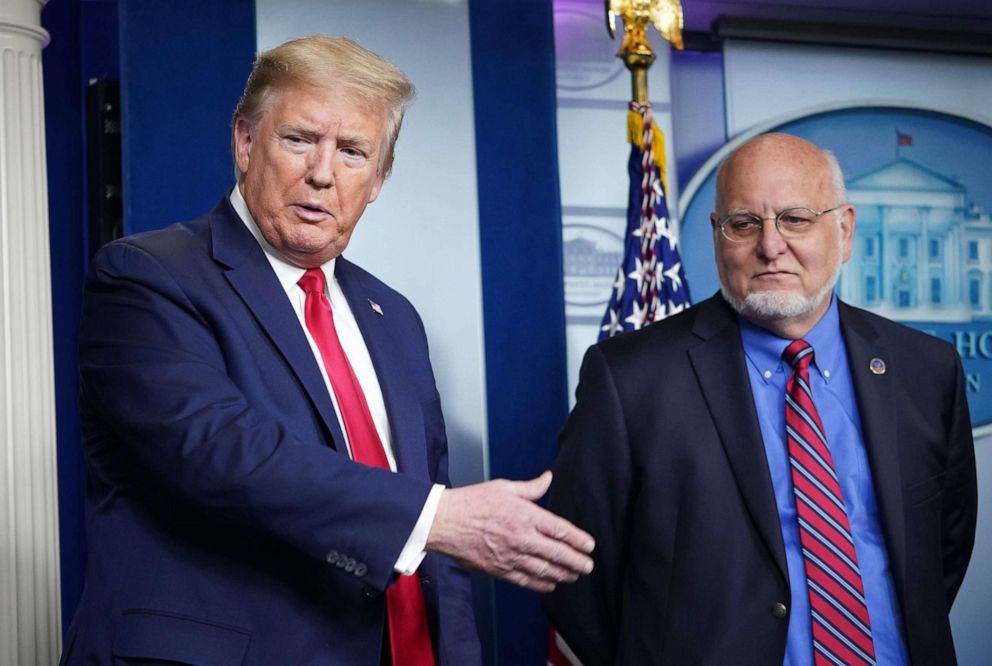
Trump, CDC's Redfield push back on headline that second wave of virus would be worse, Trump downplays risk
President Donald Trump opened Wednesday's coronavirus task force briefing by trying to walk back a warning from the Centers for Disease Control and Prevention Director Dr. Robert Redfield about a possible second wave of the virus in the fall -- before asking Redfield to take the podium himself and clarify his statement.
"When I commented yesterday that there was a possibility of the fall-winter, next fall-winter could be more difficult, more complicated, when we have two respiratory illnesses circulating at the same time, influenza and the coronavirus-19 -- I think it's really important to emphasize what I didn't say," Redfield said. "I didn't say that this was going to be worse. I said it was going to be more difficult and potentially complicated because we'll have flu and coronavirus circulating at the same time."
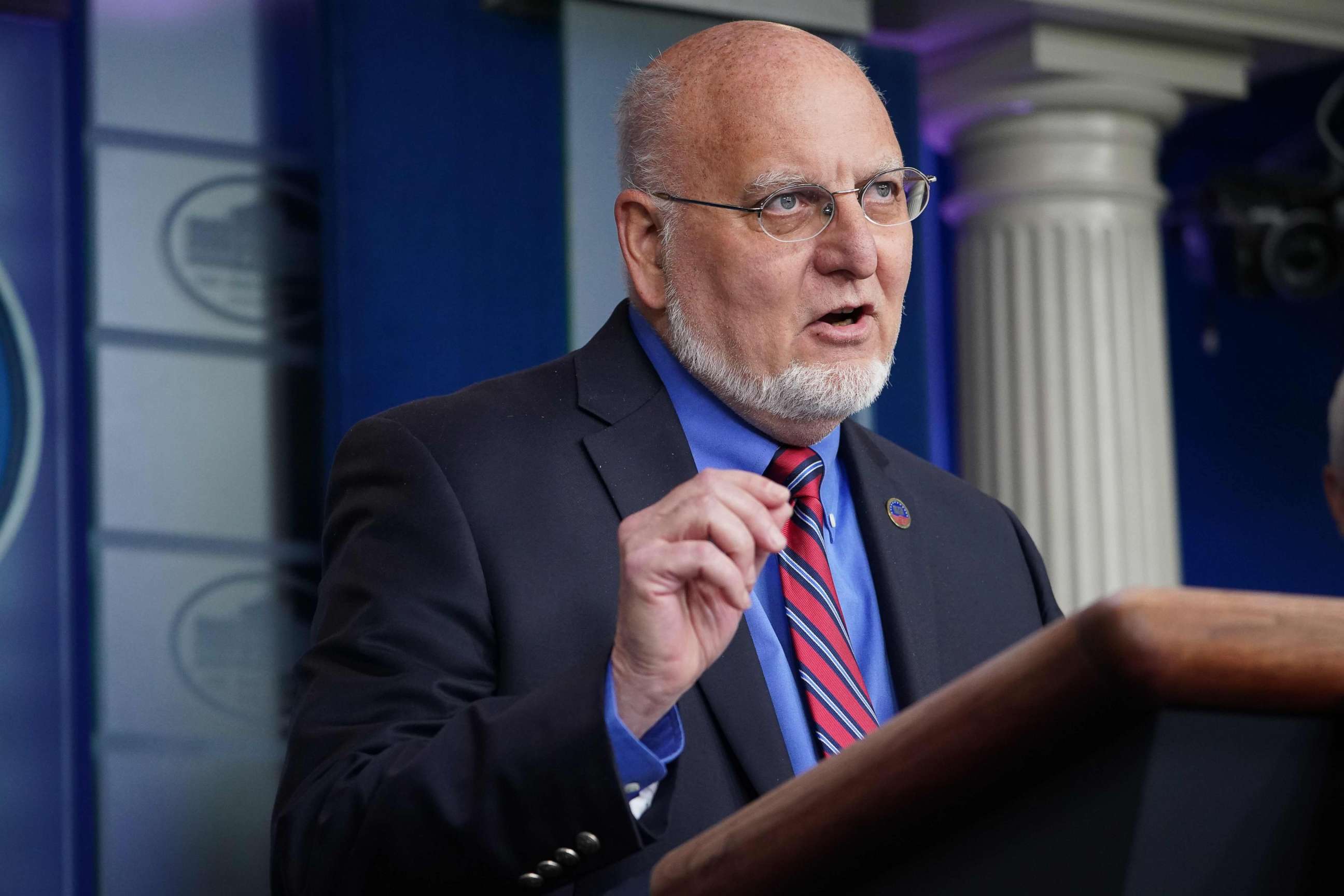
Redfield had told the Washington Post in an interview Tuesday: "There's a possibility that the assault of the virus on our nation next winter will actually be even more difficult than the one we just went through… We're going to have the flu epidemic and the coronavirus epidemic at the same time."
President Trump interjected that Redfield "was totally misquoted" -- but when ABC News' Chief White House Correspondent Jonathan Karl asked Redfield directly about the above quote, Redfield said he was quoted correctly.
The president then insisted that the headline on the article -- "CDC director warns that second wave of coronavirus could be even more devastating" was misleading. Redfield said the headline was "inappropriate."
"What the doctor was saying, and I spoke to him at great length, he was saying if it should come back, you have the flu and the embers of corona, but in my opinion from everything I've seen, it can never be like anything like we witnessed right now," the president said, predicting the novel coronavirus may not come back at all, and if it does it will be in "embers" or "pockets."
"It's nothing like -- what we've just gone through, we will not go through. You could have some embers of corona and a big flu system and if they combine and come together, it's not great but we will not go through what we went through for the last two months," Trump added. "It might not come back at all. He's talking about a worst-case scenario where you have a big flu and you have some corona."
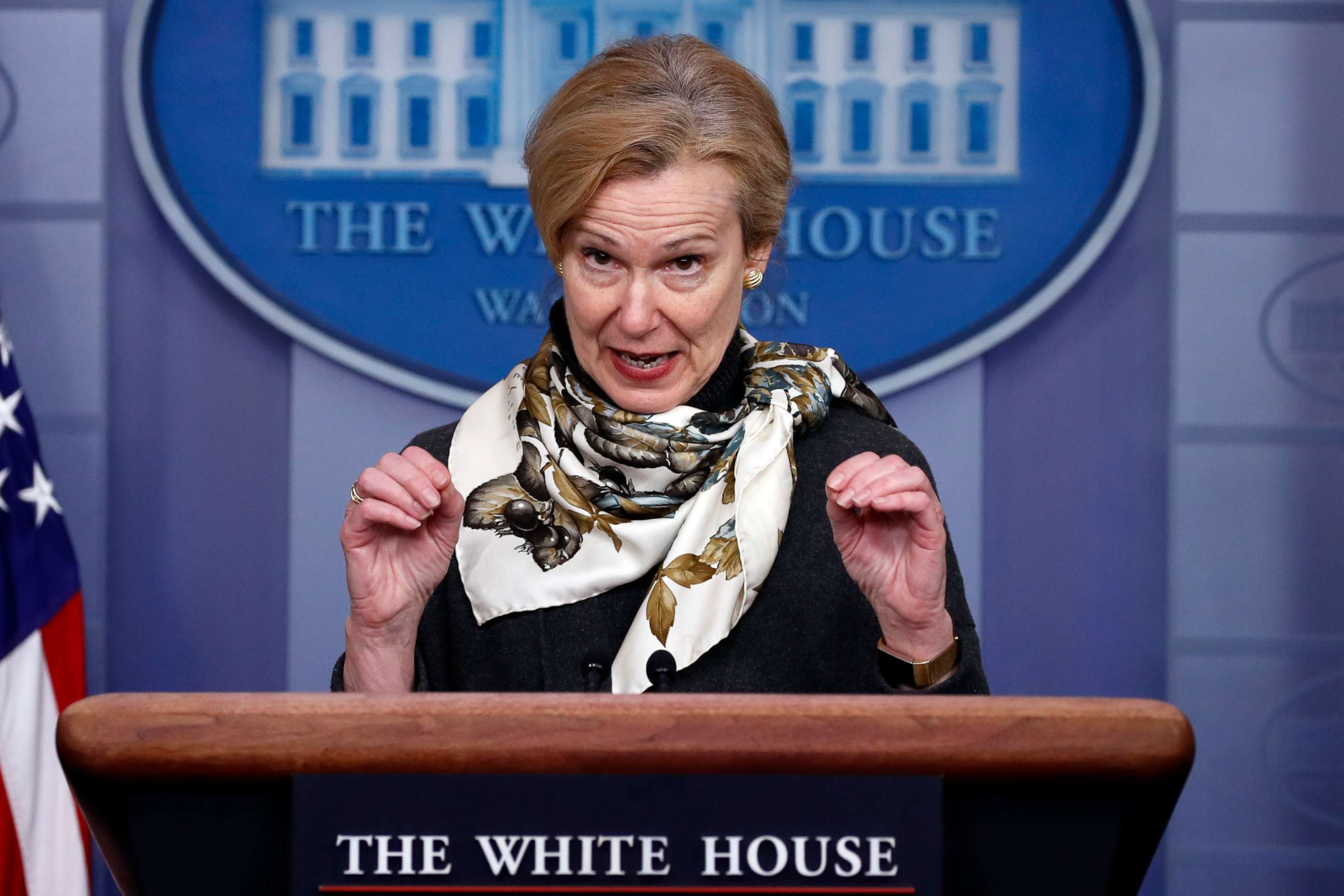
Speaking after Redfield, White House coronavirus response coordinator Dr. Deborah Birx said that if the coronavirus returned in the fall, medical professionals would be able to find it earlier.
"When we first interacted with this virus for the first time in the February and March timeframe, we didn't have an understanding of its transmissibility all of its symptoms. We do now," Birx said.
While she did not respond to the president saying that a second wave of coronavirus would not be "anything near what we went through," Birx said the country would be prepared.
"(We are) preparing for that potential right now," she said.
Later in the briefing, Dr. Anthony Fauci, the nation's top infectious disease expert, contradicted Trump, telling reporters that he is "convinced" the coronavirus will have a resurgence this fall.
"I am convinced of that because of the degree of transmissibility that it has, the global nature," he said.
While Fauci said the virus would return, he also agreed with Trump and Birx that the U.S. would be better prepared to confront it.
"What happens with that will depend on how we are able to contain it when it occurs. And what we are saying is that in the fall, we will be much, much better prepared to do the kind of containment compared to what happened to us this winter," he said.
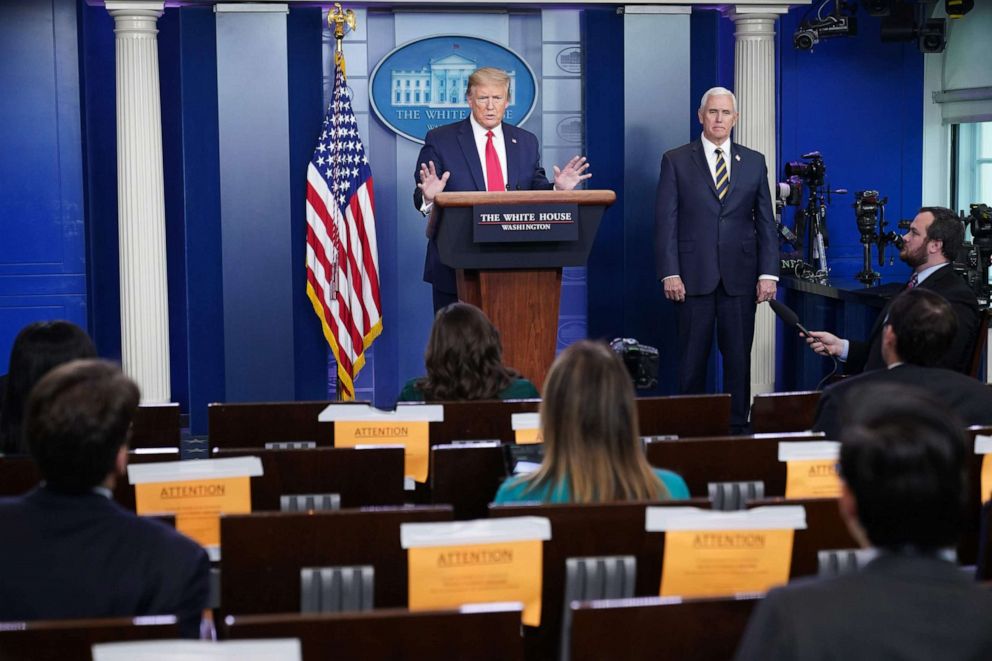
Trump touts ‘Opening Up America Again' guidelines as states plan to reopen, but breaks from Georgia's Kemp
Switching gears to the new White House guidance on reopening, Trump said it's been "encouraging" and "beautiful" to watch states lift restrictions and reminded that specific plans for reopening will be left up to individual governors.
"It's been encouraging to watch states begin to open up and it has been -- it's a beautiful thing to see as restrictions are lifted -- we must maintain vigilance and continue practicing social distancing," Trump said. "The governors are going to adhere or do what they think is best. I want them to do what they think is best."
As the U.S. death toll passed 46,000 Wednesday, a key model from the University of Washington used by the White House is now suggesting a dozen states -- including Georgia -- wait until at least June 8 to relax current measures.
Trump said he spoke to GOP Gov. Brian Kemp of Georgia last night and criticized his decision to reopen several different businesses amid the outbreak.
"I told the governor of Georgia, Brian Kemp, that I disagree strongly with his decision to open certain facilities which are in violation of the phase one guidelines for the incredible people of Georgia they're incredible people," he said.
Kemp has faced backlash since announcing he would allow nail salons, massage parlors, bowling alleys and gyms to open on Friday.
"It's just too soon. I think it's too soon," Trump said, "safety has to predominate."
"I told the governor very simply that I disagree with his decision, but he has to do what he thinks is right," he added, sticking to his stance that the decisions should be left to the states.
Fauci then weighed in, saying, "The mitigation that we out in with the first 15 days and then the 30 day mitigation program of physical distancing worked. So it got us to where we are today. It is a successful formula. It is the basis for our being able to say that we can now think seriously about reopening America."
He reminded that the reopening program is not going to be like a "light switch" across the country and cautioned governors to proceed in a "very careful, measured way."
"I know there's an urge we all have to get out there and get it over with. Let's get back to normal for a lot of good reasons, because there's a lot of suffering, economic and otherwise," Fauci said.
"As I pleaded early on, weeks ago, I pleaded with the American public, governors, mayors. Although I know one has the tendency to leapfrog over things, don't do that. Do it in a measured way. This is a successful formula," he said.
Asked directly about Kemp's decision to start reopening businesses with physical contact on Friday, Fauci said, "I would advise him as a health official and as a physician not to do that."
Trump says 'never heard of him' when asked about doctor claiming he faced retaliation for questioning use of drug Trump touted
When ABC Chief White House Correspondent Jonathan Karl asked the president about the head of the federal agency in charge of producing a COVID-19 vaccine claiming he was pushed out of his job this week because he raised questions about hydroxychloroquine and other treatments touted by the president, Trump said he was unaware.
"I've never heard of him. You just mentioned a name. I never heard of him. When did this happen?" Trump said. "No, I never heard of him. If the guy says he was pushed out of a job, maybe he was. Maybe he wasn't. You'd have to hear the other side. I don't know who he is."
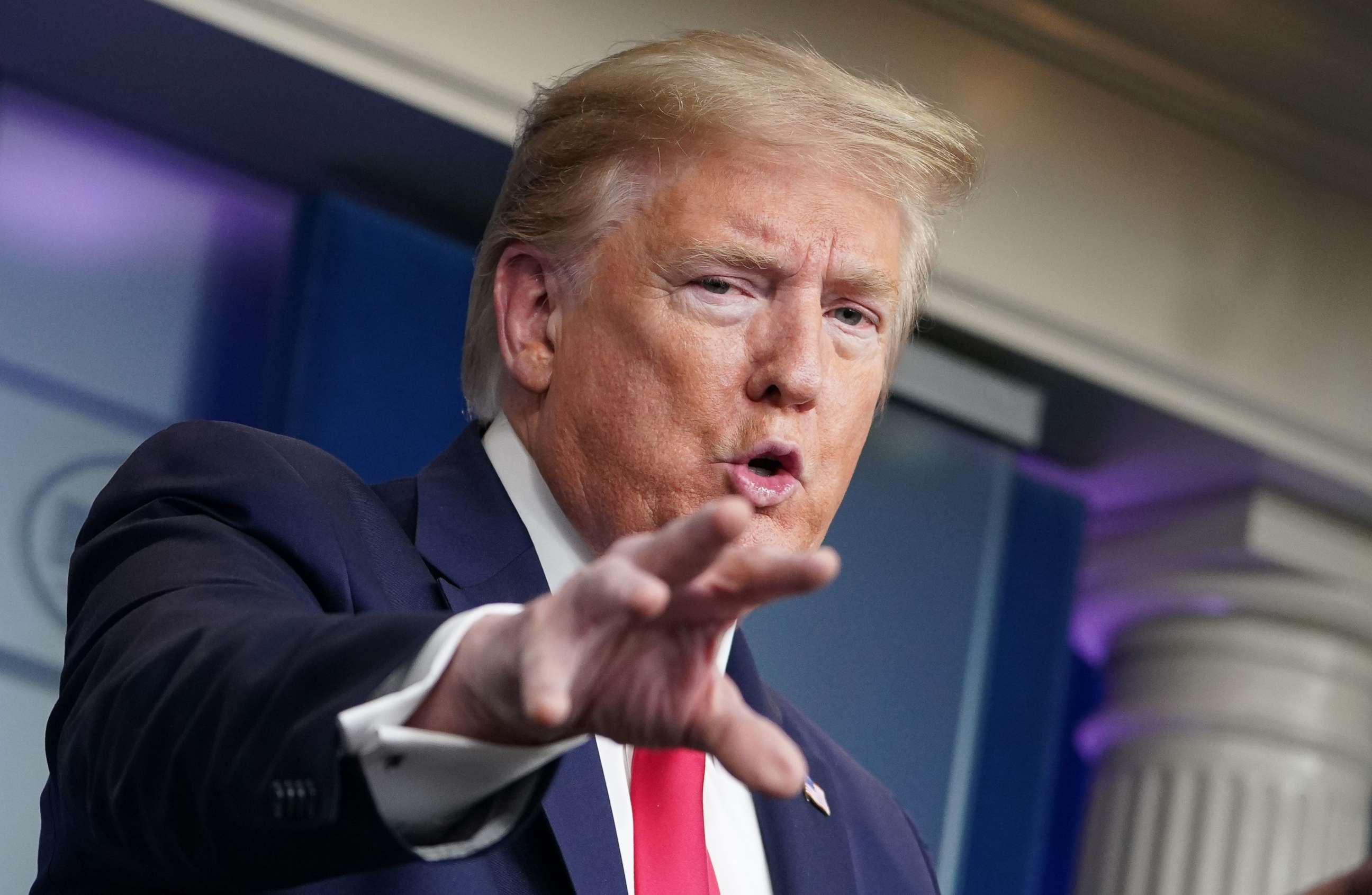
Dr. Rick Bright, who headed the federal agency overseeing the COVID-19 vaccine effort until this week, said Wednesday he was removed from his federal post as retaliation after he pushed for more vetting and wouldn't promote unproven coronavirus treatments touted by President Trump.
In a statement first reported by the New York Times, Bright said, "I am speaking out because to combat this deadly virus, science -- not politics or cronyism -- has to lead the way."
After President Trump for weeks touted the promise of the anti-malarial drug hydroxychloroquine as a potential "game changer" in the treatment for COVID-19 against the advice of his own public health officials, he has brushed off questions this week that the drug is performing poorly.
Trump says he signed 'executive order' on immigration
Trump confirmed that he had signed an "executive order" that will temporarily suspend immigration into the United States, although a White House document called it a "proclamation."
"In order to protect our great American workers I've just signed an executive order temporarily suspending immigration into the United States. This will ensure that unemployed Americans of all backgrounds will be first in line for jobs as our economy reopens," Trump said.
The announcement has ignited both confusion and outrage since Tuesday as the consequences of the order remain unclear with advocacy groups fearing a greater crackdown on vulnerable immigrants.
"I've just signed it just before coming into the room," Trump said.
"As to amending it or extending it, that we can do at the appropriate time, but it's now signed," he added.
From earlier today:
Trump says national parks to start to reopen, but Pence says administration will talk with governors first
At a tree-planting ceremony at the White House to mark the 50th anniversary of Earth Day, President Trump announced national parks and public lands would "quickly" start to be reopened.
"Thanks to our significant progress against the invisible enemy, I'm pleased to announce that in line with my administration's guidelines for opening up America again, we will begin to reopen our national parks and public lands for the American people to enjoy," Trump said. "That's going to be very exciting."
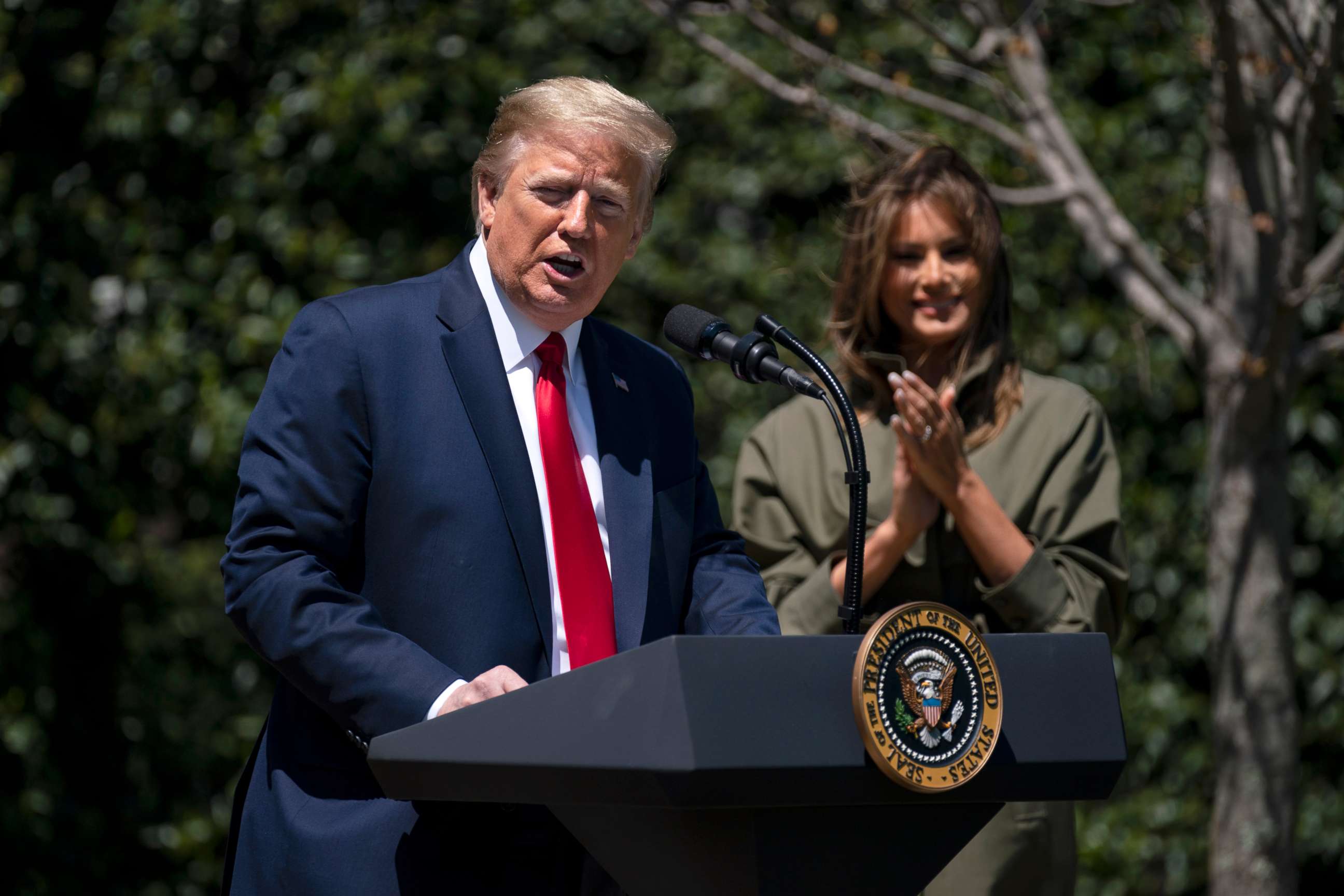
Vice President Mike Pence clarified that the White House or task force will begin to talk with governors about plans to reopen parks, not that reopening them is imminent, after Interior Secretary David Bernhardt also said the timeline to reopen facilities will "run right alongside the governors."
"We also celebrate it with a word from the secretary that, at your direction, in the days ahead we will work closely with governors to reopen our national parks so that the American people can enjoy the blessings of those extraordinary places," Pence said.
The Interior Department has insisted through the pandemic that decisions about when to close some of the more popular parks were made in coordination with state and local health officials, in many cases deciding to close when the area was put under a mandatory stay-at-home order. Many parks have actually stayed open, despite crowd concerns, and others have discouraged visitors by closing off parking lots and recreational areas.
A department spokesman told ABC News more details will be provided in the coming days on plans to reopen specific parks following guidance from the White House Office Office of Management and Budget and the president's "Opening Up America Again" plan.
The president was also joined Wednesday by first lady Melania Trump, second lady Karen Pence, Agriculture Secretary Sonny Perdue and House Minority Leader Kevin McCarthy. They used gold-colored shovels to scoop dirt onto the base of a maple tree they planted on the White House South Lawn.
-- ABC News' Ben Gittleson and Stephanie Ebbs
Cuomo calls Oval Office meeting with Trump a "productive visit," says they have a plan on testing
New York Gov. Andrew Cuomo, in his daily coronavirus press conference from Albany, called his Oval Office meeting Tuesday with President Trump a "productive visit" and said the two have a response plan moving forward despite their political differences.
"To me, a productive visit means we spoke truth, we spoke facts, we made decisions, and we have a plan going forward. And that was accomplished yesterday, and I feel good about it personally," Cuomo said Wednesday.
"And by the way, these are people in the White House who politically don't like me. That's the fact you see in the president's tweets. He's often tweeted very unkind things about me and my brother. Politically, he does not, we've had conflicts. Back and forth. But we sat with him, sat with his team, and that was put aside," Cuomo continued. "We're not setting up a possible marriage here. Just do the job."
Cuomo went on to say that he will not succumb to any political pressure to rush into reopening the state, acknowledging public unrest but saying that "more people will die if we're not smart" -- after the president tweeted this morning that the country is starting to "open for business."
"This is not going to be over anytime soon. I know people want out. I get it. I know people want to get back to work," Cuomo said. "We're not going to have people lose their lives because we acted imprudently."
Trump tweets he'll sign immigration order today, backs away from broad ban to target green card holders
President Trump tweeted this morning to confirm that he intends to sign his promised executive order to "pause" green card applications for 60 days.
Trump said that in addition to the new order, which appears to fall far short of the total ban he at first teased, security at the southern border "is very tight."
Security at the southern border, which aims to prevent undocumented immigration, and green card applications are two distinct issues -- but as Trump looks to make the connection, it demonstrates that the president is politically eager to tie immigration to the ongoing pandemic.
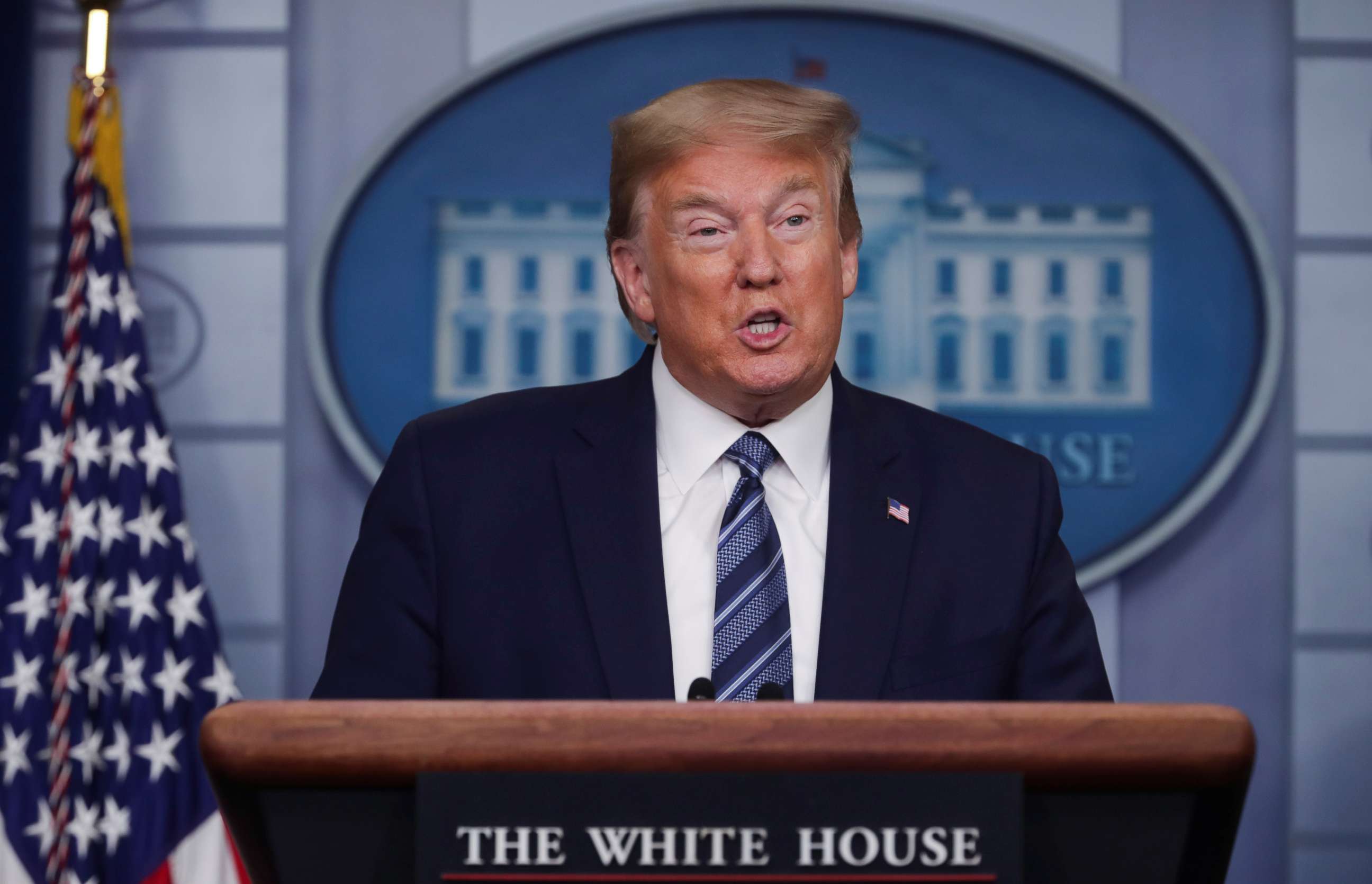
Though it was not mentioned in the tweet, Trump said at Tuesday's briefing that the order would not apply to farmers.
The Trump administration also barred asylum seekers from the U.S. last month, citing a drain on the country's medical resources.
-- ABC News' Jordyn Phelps and Quinn Owen
ABC News' Sarah Kolinovsky contributed to this report.
What to know about Coronavirus:
- How it started and how to protect yourself: Coronavirus explained
- What to do if you have symptoms: Coronavirus symptoms
- Tracking the spread in the US and Worldwide: Coronavirus map